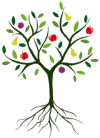Saturn
Saturn is a good new English apple, developed by the famous East Malling Research Station and released 1997. It has all the best qualities of a modern apple - an attractive sweet/ flavour with a tangy edge to it, clean appearance, and crisp flesh.
The main parentage is Golden Delicious - not a popular variety in the UK, but it is the attractive crisp textured flesh that is inherited by Saturn, not the rather bland sweet flavour. Instead Saturn seems to gets its balanced sprightly flavour from Jonathan, a well-regarded 19th century American apple with an altogether more interesting and complex flavour.
It is also disease-resistant and heavy-cropping.
Saturn apple trees for sale
RF11-year bare-root
tree
on M26 rootstock£34.95
Mature height: 2m-3.5m after 10 years
Suitable for a semi-dwarf apple tree, a medium apple spindlebush, a medium apple fan or espalier, a large apple cordon or U-cordon. Available next season
RF21-year bare-root
tree
on MM106 rootstock£34.95
Mature height: 3m-5m after 10 years
Can be trained on as a large free-standing apple tree, a half-standard apple tree, a large apple fan or espalier, or a pleached apple tree. Available next season
Growing and Training
Saturn is typical of modern apple varieties in that it has a complex parentage which includes natural disease resistance (often found in crab-apples). As a result it is a good choice for gardeners who want to grow apples without spraying.
Some authorities state that Saturn is self-fertile, but this is not documented by the developers of this variety. We think it is best to assume that it requires a pollination partner to ensure it sets a good crop. Overall it is an excellent variety for the garden or community orchard.
Recommended pollinators for Saturn apple trees
Saturn is partially self-fertile, so you do not need another variety to pollinate it to produce fruit.
However you will get a better crop if you plant any of the following pollinator varieties nearby.
If you are not sure about pollination requirements don't hesitate to ask us.
ScrumptiousScrumptious is a modern award-winning early-season English dessert apple.
SpartanSpartan produces lots of crimson maroon apples, crunchy, sweet, easy to grow, delicate "vinous" flavour.
Red FalstaffRed Falstaff is one of the best garden apple trees, heavy crops, easy to grow, and very juicy.
SunsetSunset is a popular garden alternative to Cox, easier to grow, with a sweet aromatic flavour.
James GrieveJames Grieve is the classic Scottish dual-purpose apple. It can be eaten fresh, and is also excellent for juicing and cooking.
FiestaFiesta (or Red Pippin) is one of the best Cox-style apples, easy to grow, with a good aromatic flavour.
Red DevilRed Devil is a good apple variety for the UK garden, and produces a sweet red-tinted juice.
GreensleevesGreensleeves is a reliable and popular mid-season green/yellow apple, easy to grow and productive.
History
Developed at East Malling, Kent. Introduced in 1997.
Saturn characteristics
- Gardening skillBeginner
- Self-fertile?Partially self-fertile
- Pollinating othersAverage
- Pick seasonMid
- Picking periodearly October
- Keeping2-3 weeks
- Food usesEating freshJuice
- Country of originUnited Kingdom
- Period of origin1950 - 1999
- Fruit colourRed
You might also like these varieties
JupiterJupiter is a popular Cox-style apple with a slightly stronger flavour.
PixiePixie produces lots of small Cox-style apples, easy to grow and keep well.
Red FalstaffRed Falstaff is one of the best garden apple trees, heavy crops, easy to grow, and very juicy.
More about apple trees
Apples are very versatile, and all varieties can be eaten or used in the kitchen. However varieties specifically grown as eating apples tend to have the best flavours for eating raw.
The main thing to decide when choosing an eating apple is when you intend to eat the apples. Early season apples are typically ready in August, and generally don't keep very long. Mid-season apples are ripe in early September, while late-season apples start to become ripe in late September and October. Many of the late-season varieties can also be stored in a fridge or cold shed for several months into the winter.
Some apple varieties are self-fertile, but most are not. However in most areas of the UK you do not need to worry whether your apple trees are self-fertile or not, as there will be other apple trees in nearby gardens to help with pollination.
